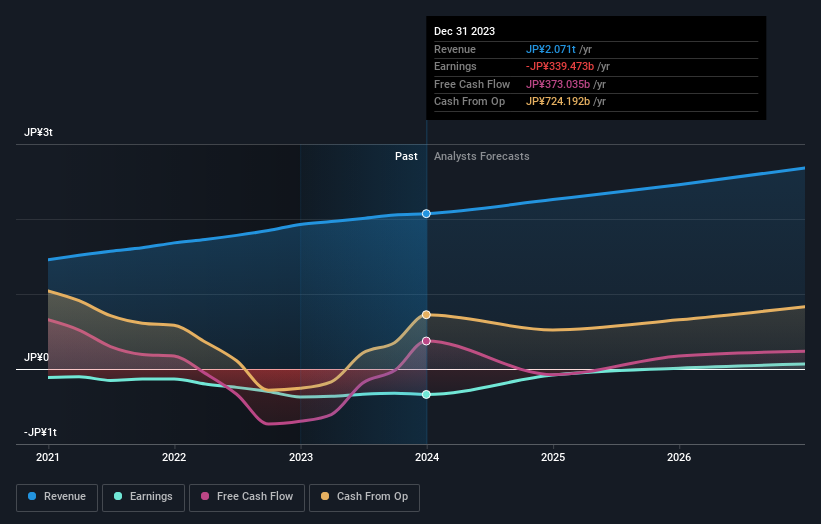Stock Analysis
Painful week for retail investors invested in Rakuten Group, Inc. (TSE:4755) after 10% drop, institutions also suffered losses

Key Insights
- The considerable ownership by retail investors in Rakuten Group indicates that they collectively have a greater say in management and business strategy
- The top 25 shareholders own 42% of the company
- Insiders own 17% of Rakuten Group
A look at the shareholders of Rakuten Group, Inc. (TSE:4755) can tell us which group is most powerful. And the group that holds the biggest piece of the pie are retail investors with 57% ownership. That is, the group stands to benefit the most if the stock rises (or lose the most if there is a downturn).
While the holdings of retail investors took a hit after last week’s 10% price drop, institutions with their 20% holdings also suffered.
Let's take a closer look to see what the different types of shareholders can tell us about Rakuten Group.
Check out our latest analysis for Rakuten Group

What Does The Institutional Ownership Tell Us About Rakuten Group?
Many institutions measure their performance against an index that approximates the local market. So they usually pay more attention to companies that are included in major indices.
We can see that Rakuten Group does have institutional investors; and they hold a good portion of the company's stock. This implies the analysts working for those institutions have looked at the stock and they like it. But just like anyone else, they could be wrong. If multiple institutions change their view on a stock at the same time, you could see the share price drop fast. It's therefore worth looking at Rakuten Group's earnings history below. Of course, the future is what really matters.

We note that hedge funds don't have a meaningful investment in Rakuten Group. The company's CEO Hiroshi Mikitani is the largest shareholder with 17% of shares outstanding. With 6.1% and 2.9% of the shares outstanding respectively, Japan Post Holdings Co., Ltd. and Nomura Asset Management Co., Ltd. are the second and third largest shareholders.
On studying our ownership data, we found that 25 of the top shareholders collectively own less than 50% of the share register, implying that no single individual has a majority interest.
While it makes sense to study institutional ownership data for a company, it also makes sense to study analyst sentiments to know which way the wind is blowing. There are plenty of analysts covering the stock, so it might be worth seeing what they are forecasting, too.
Insider Ownership Of Rakuten Group
While the precise definition of an insider can be subjective, almost everyone considers board members to be insiders. The company management answer to the board and the latter should represent the interests of shareholders. Notably, sometimes top-level managers are on the board themselves.
I generally consider insider ownership to be a good thing. However, on some occasions it makes it more difficult for other shareholders to hold the board accountable for decisions.
It seems insiders own a significant proportion of Rakuten Group, Inc.. Insiders own JP¥282b worth of shares in the JP¥1.6t company. That's quite meaningful. Most would say this shows a good degree of alignment with shareholders, especially in a company of this size. You can click here to see if those insiders have been buying or selling.
General Public Ownership
The general public, mostly comprising of individual investors, collectively holds 57% of Rakuten Group shares. This level of ownership gives investors from the wider public some power to sway key policy decisions such as board composition, executive compensation, and the dividend payout ratio.
Public Company Ownership
Public companies currently own 6.1% of Rakuten Group stock. We can't be certain but it is quite possible this is a strategic stake. The businesses may be similar, or work together.
Next Steps:
While it is well worth considering the different groups that own a company, there are other factors that are even more important. Take risks for example - Rakuten Group has 2 warning signs we think you should be aware of.
Ultimately the future is most important. You can access this free report on analyst forecasts for the company.
NB: Figures in this article are calculated using data from the last twelve months, which refer to the 12-month period ending on the last date of the month the financial statement is dated. This may not be consistent with full year annual report figures.
Valuation is complex, but we're helping make it simple.
Find out whether Rakuten Group is potentially over or undervalued by checking out our comprehensive analysis, which includes fair value estimates, risks and warnings, dividends, insider transactions and financial health.
View the Free AnalysisHave feedback on this article? Concerned about the content? Get in touch with us directly. Alternatively, email editorial-team (at) simplywallst.com.
This article by Simply Wall St is general in nature. We provide commentary based on historical data and analyst forecasts only using an unbiased methodology and our articles are not intended to be financial advice. It does not constitute a recommendation to buy or sell any stock, and does not take account of your objectives, or your financial situation. We aim to bring you long-term focused analysis driven by fundamental data. Note that our analysis may not factor in the latest price-sensitive company announcements or qualitative material. Simply Wall St has no position in any stocks mentioned.
About TSE:4755
Rakuten Group
Rakuten Group, Inc. provides services in e-commerce, fintech, digital content, and communications to various users in Japan and internationally.
Reasonable growth potential with adequate balance sheet.

